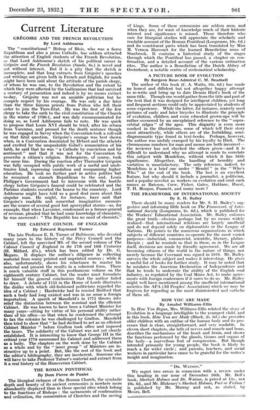Current Literature
GREGOIRE AND THE FRENCH REVOLUTION By Lord Ashbourne
The " constitutional " Bishop of Blois, who was a fierce Republican and also a pious Catholic, has seldom attracted the attention of English students of the French Revolution, so that Lord Ashbourne's sketch of his political career in Gregoire and the French Revolution (Sands, 6s.) is novel and not without interest. But it is a pity that the sketch is incomplete, and that long extracts from Gregoire's speeches and writings are given both in French and English, for much might have been said about the attitude of the parish clergy, of whom he was one, to the Revolution and the extent to which they were affected by the Gallicanism that had survived a century of persecution and indeed is by no means extinct to-day. Gregoire was not an amiable politician but he compels respect by his courage. He was only a day later than the three famous priests from Poitou who left their order to join the Tiers-Etat. He was the first of the few clergy to take the oath to the civil constitution of the Church in the winter of 1790-1, and was duly excommunicated for doing so, as Lord Ashbourne fails to note. He was quick to propose that Louis XVI should be tried, after his return from Varennes, and pressed for the death sentence though he was engaged in Savoy when the Convention took a roll-call on that fatal question. Gregoire's courage was best shown when, in a Convention dominated by Hebert and the atheists and excited by the unspeakable Gobel's renunciation of his faith, he said that he was "a Catholic by conviction and by sentiment" and that it was not for the Convention to prescribe a citizen's religion. Robespierre, of course, took the same line. During the reaction after Thermidor Gregoire was fully occupied with public work of a useful and unob- trusive kind, repressing vandalism and reorganizing higher education. He took no further part in active politics but he remained a staunch Republican to the end. Louis Philippe's Government had to intervene with the hostile clergy before Gregoire's funeral could be celebrated and the Parisian students escorted the hearse to the cemetery. Lord Ashbourne might have told us a good deal more about this singular man. He might, for instance, have said that Gregoire's readable and somewhat imaginative memoirs are the source of several good but apocryphal stories—as, for example, that when Lavoisier, condemned as a farmer-general of revenue, pleaded that he had some knowledge of chemistry, he was answered : "The Republic has no need of chemists:1.


























 Previous page
Previous page